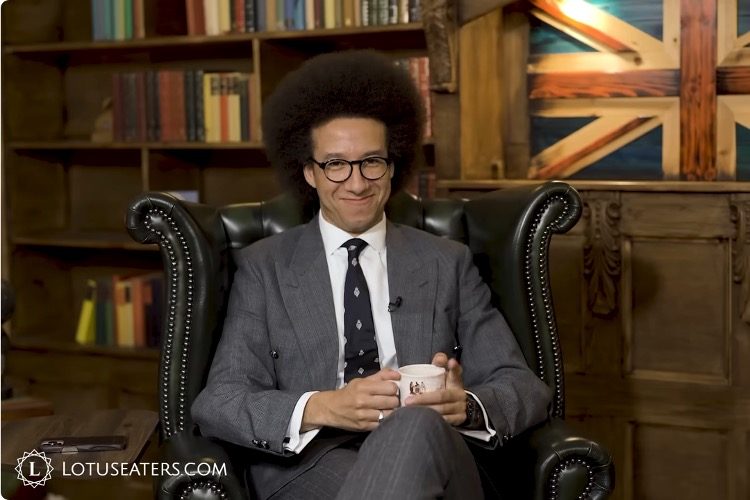
“Progress is a comparative of which we have not settled the superlative.” This observation, by English philosopher G.K. Chesterton, is ideal to confront progressives with because they invariably won’t be able to refute it (partially because they won’t know what it means!). What it means, however, is quite profound, and one man who certainly would agree is another Englishman, Anglican minister and prominent commentator Deacon Calvin Robinson.
In fact, speaking recently with FOX News Digital, Robinson averred “that the term ‘progressive Christian’ is an ‘oxymoron,’ and stated that the liberal, ‘neo-Marxist’ thought that has infected the minds of some leaders and congregants in both the Anglican and Roman Catholic churches is ‘one of the devil’s tools’ being used to destroy Christianity from within,” related Fox News on Monday. The site then continued:
Robinson, a staunch proponent of Christian orthodoxy who uses his media platform to warn about relativism and liberalism supplanting clear Christian teaching, claimed that Christians who prioritize liberal ideas of inclusivity are “twisting” the truth of Christianity.
Robinson gave his statements amidst complicated times for Christians … in the West.
In recent months, a contingent of Roman Catholic bishops in Germany have insisted on blessing same-sex unions; Anglican bishops have given serious thought to updating the “Our Father” with gender-neutral pronouns; and Pope Francis has knocked American Catholic conservatives at war with liberal ideologies, claiming they have a “reactionary attitude” and ascribing a character of “backwardness” to them.
American Christians at large have also found themselves confronting an encroaching culture of “anti-racism,” climate change activism, and an assertive LGBTQ agenda.
Robinson was firm and clear about what this prevailing culture of liberalism presents for Christians in the west. He declared, “Liberalism is the greatest threat to [Christianity] — current — because it’s one of the tools that the devil is using.”
This certainly brings back memories. Decades ago, when in my early 20s, I related to my best friend a realization I’d had, which I then always expressed thus: “Liberalism is what evil is masquerading as in our time.” I explained my insight in a very simple way, one that hasn’t passed my lips much in recent years but which I’ll now repeat because it had such a profound effect on my buddy.
“Liberalism is like a bad parent,” I said (I’m paraphrasing), “one who doesn’t hold his kids responsible or instill discipline.” “Instead, that parent says, ‘You’re not responsible for what you do; you don’t have to pay for what you get. Don’t go to school if you don’t want to, and have ice cream for dinner if you please.’” It made a light bulb go off in my friend’s head, for good reason: It happens to be true.
Returning to Robinson, he had even more to say about the matter. Mirroring Pope Pius XI, who wrote in 1931 that “no one can be at the same time a good Catholic and a true Socialist,” he told Fox that you “can either be a Christian or you can be progressive.” What’s more, as IJR.com relates, Robinson
also emphasized the importance of acknowledging gender [read: sex] differences within Christianity.
“The Christian faith is inherently conservative because it provides a set of values that are seen by the modern world as conservative — ideas such as marriage is between one man and one woman, that God made us male and female, and he made those different. You know, we’re not equal in terms of being the same,” Robinson explained.
He continued, “We’re equal in terms of dignity and worth. But we are complementary and different for a purpose.”
… He further condemned progressive Christianity alleging, “it is about twisting the truth again” and “all a lie.”
“You can either have the truth or not the truth. The truth is objective, right? So you have truth or lie,” he stated.
And this warning about relativism — a pseudo-philosophy I’ve written about continually over the decades — cuts to the matter’s heart. For relativism lies at liberalism’s heart.
This is why, especially back when the Left had less power, you’d often hear liberals dismiss unwelcome realities with “That’s your truth; mine is different” or “Don’t impose your values on me!” (Now, having more power, they’re busy imposing values.)
This makes liberalism Christianity’s very antithesis — and, therefore, a believer might say, the work of the Devil — because the faith not only states that there is Truth, but what it is. (“I am the way, and the truth, and the life,” said Jesus.)
A correlation of this is that most Americans have fallen victim to Satan’s snares because the vast majority of them are relativists (including many well-meaning people). Yet also correlative is that liberalism can be defeated by cultivating belief in and knowledge of Truth — for a lie-based ideology cannot exist in a Truth-infused universe.
This brings us to Chesterton’s comparative/superlative comment (did you think I was going to leave you hanging on that?). Chesterton meant that since progress (the comparative) implies movement toward a goal (the superlative), insofar as you become unsure of the goal, you’ll be unable to accurately measure the progress.
This also makes liberalism Christianity’s polar opposite. For recognizing Truth and the principles derived from it, Christianity has a very clear vision (goal) for man; liberalism denies Truth, however, and its relativism means it involves no real vision for society, only provisional objectives derived from its interminable opposition to “what is” (the status quo). One small example:
Christianity’s unchanging vision for marriage is a man and woman united in holy matrimony. In contrast and contrary to conservatives’ accusation, liberals never actually redefined marriage, thus providing their own vision — they “undefined” it (explanation here).
As for “progressive Christianity,” it’s not the first time man has twisted the faith to serve sinister ends — the Nazis had their “positive Christianity.” And the same thing is always forgotten:
As theological yardstick and not ideological cudgel, Christianity is meant to shape ends, not serve them.


